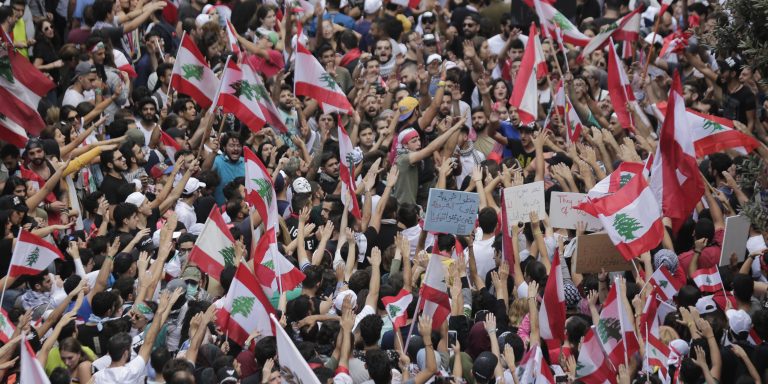INTELBRIEF
October 21, 2019
IntelBrief: Widespread Protests in Lebanon Transcend Sectarian and Political Divides

- Late last week, Lebanon erupted in protests in response to the government’s attempt to impose a tax on the popular messaging app WhatsApp.
- The protests have focused on a range of topics, including corruption, austerity measures, failing infrastructure, and pervasive economic mismanagement.
- The protests have managed to transcend Lebanon’s infamous sectarian and political divides, spanning all cross-sections of society to demonstrate legitimate grievances that impact myriad demographics and constituencies.
- The protests in Lebanon come on the heels of other anti-corruption demonstrations that have swept the region in recent weeks, including protests in Egypt and Iraq.
.
An attempt by the Lebanese government to levy a tax on the messaging service WhatsApp sparked a week of widespread demonstrations throughout the country protesting corruption, austerity measures, failing infrastructure, and pervasive economic mismanagement. But perhaps the most interesting aspect of these protests is that, at least so far, they have managed to transcend sectarian and political divides, spanning all cross-sections of Lebanese society to demonstrate legitimate grievances that impact myriad demographics. In Beirut, Tripoli, and other Lebanese cities and towns, protesters took to the streets to light bonfires, chant, and participate in rallies against the current government. The demonstrators’ mounting frustration is the cumulative outrage against stagflation, a growing public debt, and the inability of the government to improve the lives of ordinary Lebanese citizens. The prospect that the nearly bankrupt and corrupt Lebanese government would seek to improve its dire financial situation by raising taxes on mobile services, while the Lebanese already pay some of the highest rates in the region, due primarily to the duopoly of two government-owned firms, was the tipping point that pushed citizens into the streets.
Lebanon is deeply divided by sect—the country’s constitution and consociational power-sharing system reinforce tribal politics. Most protests in Lebanon are sectarian or based around one’s affiliation to a political party, which in Lebanon almost always translates to sectarianism. Almost from the beginning, it became clear that the WhatApp tax protests were different, transcending sectarian, religious, ethnic, and political loyalties. These kinds of protests are rare, yet influential in what they purport to represent—genuine grassroots outrage at the establishment and status quo. The government’s inability to effectively combat recent devastating wildfires was just the latest in a long string of failures by successive governments, administrations, and power-sharing configurations. The famed cedars of Lebanon burned while the government continued its sclerotic and corrupt actions under the guise of a functioning government.
Prime Minister Hariri stated he had understood the protesters' grievances, even while passing the blame and deflecting responsibility for the crisis, saying he had worked hard to help guide the country through its persistent economic quagmire. He also rescinded the 'WhatsApp' tax, but by that point, it was clear that half-hearted gestures from politicians would do little to attenuate the groundswell of outrage permeating the population. It is unclear if the Hariri government will survive this crisis. Over the weekend, four ministers from the Lebanese Forces party, a Lebanese Christian party and traditional Hariri ally, resigned from the government in protest. What has become even more apparent is that the problems of Lebanon extend far beyond the current administration. Hezbollah leader Hassan Nasrallah delivered an impassioned speech on October 19th in which he said all Lebanese politicians and parties shared the blame for the decades of poor governance. Nasrallah asserted that Lebanon’s politicians characteristically blamed anyone else but themselves, with the end result of evading accountability. Hezbollah’s role and influence in Lebanon's politics and economy have played no small part in the corruption, egregious clientelism, and sectarian dysfunction that has plagued the country since its disastrous civil war of 1975 to 1990.
The protests in Lebanon come on the heels of other anti-corruption demonstrations that have swept the region in recent weeks, including protests in Egypt and Iraq. There are no easy answers or quick-fix policy solutions that will address Lebanon’s problems substantively and comprehensively. The country faces significant challenges, including economic malaise, massive numbers of refugees and internally displaced persons, ecological pressures exacerbated by climate change, and a government so inept at times that it seems unable to manage even basic municipal tasks like garbage collection. Foreign aid, especially from the United States, is complicated by the significant role Hezbollah plays in the Lebanese government. The system of government that was put into place after the civil war, in which sectarian concerns outweigh all others, has proven unable to address the needs of the country. The current protests are a manifestation of the many challenges facing Lebanon, faced by all sects and a burden primarily borne most tangibly by the poor and politically marginalized.
.
For tailored research and analysis, please contact: info@thesoufancenter.org